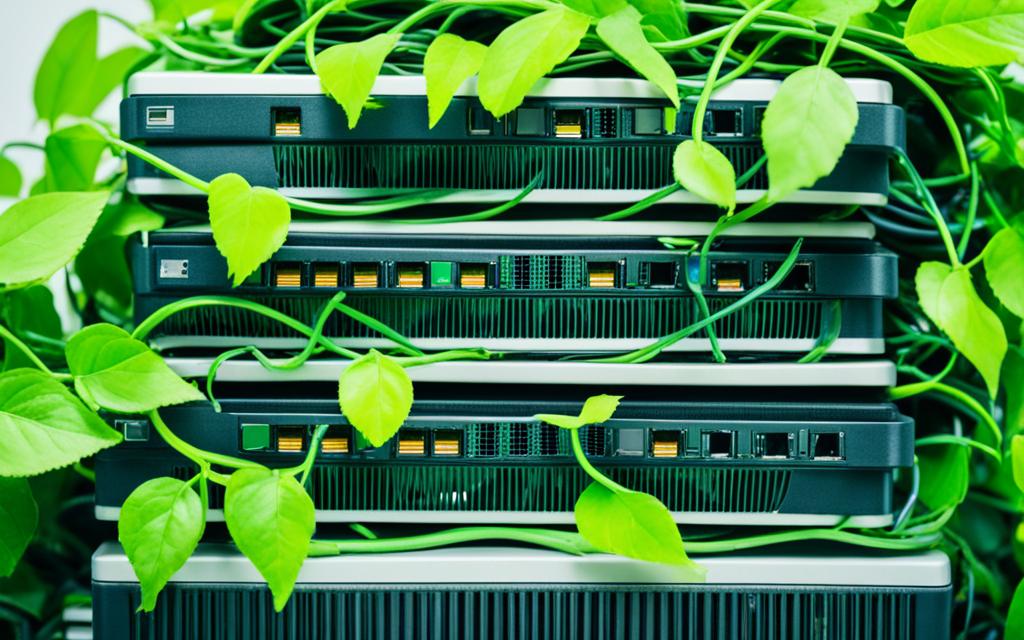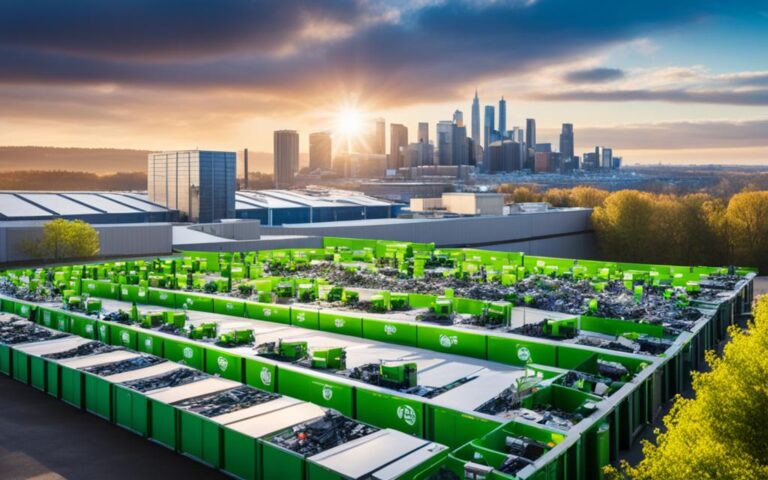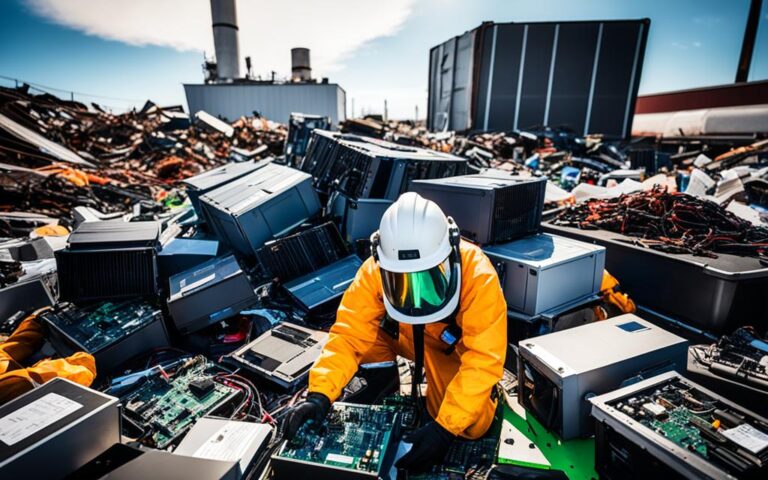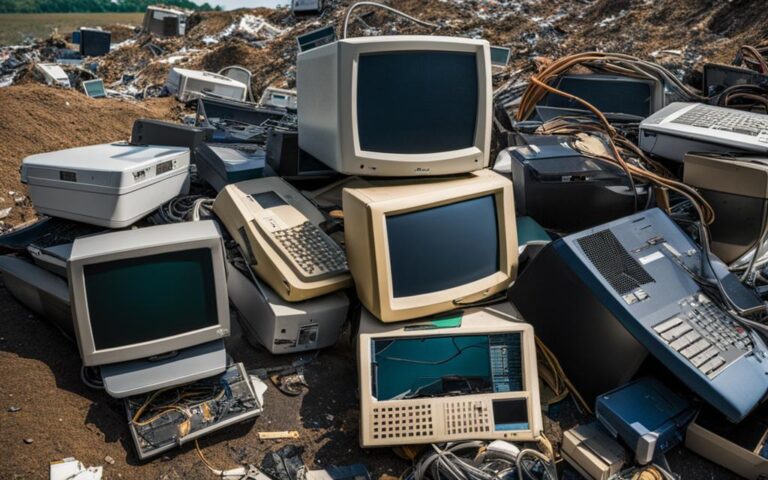Server Recycling: A Guide to Understanding Its Environmental Benefits
In today’s digital age, server recycling plays a vital role in protecting our data and the environment. It not only ensures data security but also contributes to a greener future by reducing electronic waste. By understanding the basics of server recycling, we can unlock a world of environmental benefits.
Improper disposal of servers can result in data breaches and environmental hazards. That’s why it’s crucial to dispose of servers properly, safeguarding sensitive information and preventing toxic components from ending up in landfills. Responsible server recycling is not only a legal and ethical responsibility but also an opportunity to make a positive impact on our planet.
Server recycling has far-reaching ecological implications. When done correctly, it reduces the demand for raw resources and minimizes the negative effects of electronic waste. By securely erasing data, breaking down servers, and reusing or recycling their components, we can conserve resources and protect our environment.
Proper server recycle practices bring numerous advantages. They extend the server lifecycle, promoting resource efficiency and conserving energy and materials. Additionally, valuable components and metals can be retrieved and potentially resold, providing economic benefits. By adopting sustainable server recycling practices, we demonstrate our commitment to data protection, compliance, and environmental responsibility.
Join us on this journey towards a greener future. By responsibly recycling servers and working with certified facilities, we can make a positive impact on the environment, prolong the server lifecycle, and enhance our company’s reputation as a responsible and environmentally conscious organization.
Stay tuned for the rest of this guide to learn more about the environmental benefits of server recycling and how to implement sustainable server disposal practices!
Why Proper Server Disposal Matters
Proper server disposal is crucial for businesses to avoid data breaches and protect their reputation. It goes beyond simply discarding old or unused servers; it involves implementing secure and responsible practices to mitigate data security risks and minimize environmental impact.
Servers often contain confidential and sensitive data, including customer information, financial records, and trade secrets. Improper disposal can leave this data vulnerable to unauthorized access, potentially resulting in data breaches and significant fines for non-compliance with data protection regulations. Protecting sensitive information is not only a legal requirement but also a trust-building exercise with customers and partners.
Environmental risks also come into play when servers are not disposed of properly. Servers contain various components, including heavy metals and hazardous chemicals, which can pose serious health and environmental risks if they end up in landfills. These toxic substances can contaminate soil, water, and air, endangering ecosystems and human health.
“Proper server disposal is not only a legal and ethical obligation; it is a responsible step towards safeguarding sensitive data and minimizing environmental hazards.”
Responsible server disposal practices, on the other hand, ensure that servers and their components are handled and recycled in an environmentally sound manner. Proper disposal methods involve securely erasing data, dismantling servers, and safely recycling or reusing their parts. By doing so, businesses can confidently mitigate the risks of data breaches and protect the environment simultaneously.
The Environmental Impact of Server Recycling
Server recycling plays a crucial role in reducing ecological implications and mitigating the mounting environmental concerns associated with electronic waste. When servers are recycled in a responsible and sustainable manner, it has a significant positive impact on the environment. Not only does it contribute to resource conservation, but it also helps in curbing the demand for raw materials.
Electronic waste, if not properly recycled, poses serious threats to the environment. It contains hazardous substances and chemicals that have the potential to leach into the ground, polluting both land and water ecosystems. By adopting effective server recycling methods, we can prevent the accumulation of electronic waste and its detrimental effects on the environment.
The Benefits of Server Recycling:
- Reduces the demand for raw resources
- Minimizes electronic waste
- Prevents the release of harmful chemicals into the environment
- Conserves energy and materials
- Protects land and water ecosystems from contamination
Proper server recycling not only helps in protecting our planet, but it also promotes sustainability by ensuring that valuable resources are efficiently utilized. By reusing server components and responsibly recycling materials, we can contribute to a cleaner and greener future.
“The proper recycling of servers can significantly reduce electronic waste and its negative impact on the environment. It’s our responsibility to adopt sustainable practices and make a difference.”
Let’s take a closer look at the environmental implications and the ecological benefits of responsible server recycling:
| Environmental Implications | Ecological Benefits |
|---|---|
| Reduces electronic waste | Conserves natural resources |
| Prevents pollution from hazardous substances | Protects land and water ecosystems |
| Minimizes the carbon footprint | Reduces the need for raw materials |
Understanding the Basics of Server Recycle
In the digital age, sustainable practices are essential in every industry, including IT. It is crucial to pay attention to the area of server recycle. By responsibly disposing of servers, businesses can ensure data protection and minimize their environmental impact.
Server recycling involves several key steps:
- Securely erasing data: Before recycling servers, it is crucial to securely erase all data to maintain confidentiality and prevent any breaches. Proper data erasure ensures that sensitive information does not fall into the wrong hands.
- Breaking down servers: Once the data has been securely erased, servers need to be broken down into their component parts. This involves dismantling the hardware and separating it into various materials, such as metals, plastics, and circuit boards.
- Responsibly reusing or recycling parts: After breaking down servers, the individual components can be responsibly reused or recycled. Valuable parts can be reused in other systems or repurposed, while materials like metals and plastics can be recycled and used in the manufacturing of new products.
By following sustainable server recycle practices, businesses contribute to the preservation of natural resources and the reduction of electronic waste. Adopting responsible server recycling methods ensures that servers are disposed of in a manner that benefits both the environment and data security.
Advantages of Proper Server Recycle Practices
Proper server recycle practices offer several benefits. They prolong the server lifecycle by reusing server components and reducing the need for new resources. This resource efficiency helps conserve energy and materials. By extending the lifespan of servers, businesses can significantly reduce their environmental footprint.
“Server recycle practices not only contribute to a greener planet but also make economic sense.”
When servers reach the end of their life cycle, valuable components or metals can be retrieved and potentially resold, providing economic advantages. This not only offsets the cost of disposing of old servers but also generates additional revenue for businesses.
“Server recycling safeguards sensitive data during disposal, ensuring data protection and compliance with regulations.”
Proper server recycling processes prioritize data security by safeguarding sensitive information during disposal. By following these practices, businesses can ensure compliance with regulations and protect themselves from potential data breaches or legal issues. It also demonstrates a commitment to ethical and responsible business practices.
“Server recycle practices showcase a company’s commitment to environmental responsibility.”
Implementing proper server recycle practices allows businesses to showcase their commitment to sustainable operations. This enhances their reputation among customers, investors, and stakeholders, highlighting their dedication to environmental responsibility and resource efficiency.
By embracing proper server recycle practices, businesses can reap numerous benefits, including prolonged server lifecycles, resource efficiency, economic advantages, data protection, and an enhanced reputation for environmental stewardship.
Conclusion
Server recycling plays a critical role in preserving our environment and ensuring sustainability for future generations. Not only does it protect sensitive data, but it also significantly reduces electronic waste and conserves valuable resources. By adhering to proper server disposal methods and collaborating with certified recycling facilities, businesses can uphold their commitment to environmentally responsible practices.
Embracing sustainable server recycling practices offers numerous benefits. Firstly, it contributes to the protection and longevity of our natural resources by reducing the demand for new materials. This resource conservation helps minimize energy consumption and promotes a greener, more efficient future.
Secondly, responsible server recycling enhances a company’s reputation as a responsible and environmentally conscious organization. By prioritizing the secure and proper disposal of servers, businesses demonstrate their commitment to data protection and compliance with regulations. This responsible approach not only safeguards sensitive data but also builds trust with customers and stakeholders.
It is crucial for businesses to take the necessary steps to responsibly recycle servers and play their part in creating a more sustainable future. By partnering with certified recycling facilities and following proper server disposal practices, companies can make a significant positive impact on the environment. Let us act together to embrace sustainable server recycling, reap the environmental benefits, and contribute to a greener tomorrow.
FAQ
What is server recycling?
Server recycling refers to the process of securely erasing data, breaking down servers into their component parts, and responsibly reusing or recycling these parts. It is an essential practice in today’s digital age for data protection and environmental preservation.
Why is proper server disposal important?
Proper server disposal is crucial to avoid data breaches and protect a company’s reputation. Improper disposal can result in significant fines and the release of toxic components into the environment. Responsible disposal also ensures compliance with regulations and minimizes environmental risks.
What is the environmental impact of server recycling?
Server recycling has a significant ecological impact. By recycling servers properly, materials can be reused, reducing the demand for raw resources and minimizing electronic waste. On the other hand, improper server disposal contributes to environmental pollution and poses health risks due to toxic components.
What are the basics of server recycle?
The basics of server recycle involve securely erasing data, breaking down servers into their component parts, and responsibly reusing or recycling these parts. It is a sustainable practice that ensures data protection and minimizes the negative impact on the environment.
What are the advantages of proper server recycle practices?
Proper server recycle practices offer several benefits. They prolong the server lifecycle by reusing components and reducing the need for new resources, conserving energy and materials. Server recycling can also yield economic advantages as valuable components or metals can be retrieved and potentially resold. Additionally, it safeguards sensitive data during disposal and enhances a company’s reputation through showcasing robust disposal practices.
How can businesses contribute to environmental preservation through server recycling?
By following proper server disposal methods and working with certified recycling facilities, businesses can ensure their server disposal practices are environmentally responsible and secure. Embracing sustainable server recycling practices benefits the environment, prolongs the server lifecycle, and enhances a company’s reputation as a responsible and environmentally conscious organization.















